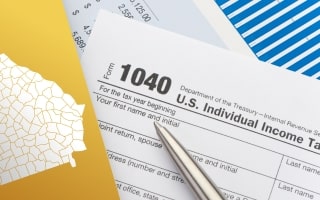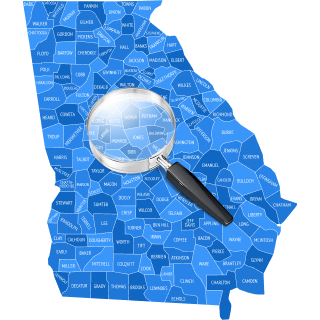Property Tax Records in Georgia

When you buy a home in Georgia, you'll be tasked with paying annual property taxes to the state. These taxes are collected by your local government to pay for numerous public services, such as schools and road maintenance.
Property taxes in Georgia are lower than the national average. Like most states, the average property tax in Georgia varies considerably from county to county. The value and size of the property dictate how much you'll end up paying. The national average for property tax is 1.11 percent, while in Georgia, the average for the entire state is 0.95 percent, but again, that varies between counties.
You're required to pay taxes to your county tax assessor's office. For example, residents of Fulton County can pay their taxes on the website of the Fulton County Board of Assessors. Counties often require payment by October 15 or December 20. While the Board of Tax Assessors is responsible for making property valuations, the Tax Commissioner must collect these payments.
The current Georgia property tax laws are based on state legislation that was passed in 1852. Taxes collected before then were governed by the Tax Act of 1804. Tax rates could either be specified as dollars per unit or a percentage of value. They varied by location and type of property.
Property Tax Assessment in Georgia

To understand how your property taxes are calculated, the amount you pay depends on the total assessed value of your home, which is primarily based on your home's market value. The Georgia tax assessor will appraise all properties in your county to identify their market values. This process often occurs via a mass appraisal.
A mass appraisal involves valuing a large group of properties using different forms of statistical testing and common data. Factors like neighborhood and property type are used during mass appraisal assessments. Once the market value is determined, the Georgia property tax assessment ratio will be applied.
Most cities and counties throughout Georgia use a standardized ratio of 40%. Let's say that your home's current market value is $400,000. Its assessed value would be $160,000. Keep in mind that the assessment ratio can be as high as 50% in some counties, such as DeKalb.
Georgia property tax rates are displayed as mills, which are currently equal to $1 in taxes for every $1,000 of assessed value. The average millage rate in Georgia counties is 30. If your home has an assessed value of $160,000 and you live in a county with a millage rate of 30, you'll pay $4,800 in annual property taxes. If you don't understand Georgia millage rates, you should dig deeper as this is an important subject to understand fully.
In Georgia, the average property tax rate is around 0.82%. However, tax rates differ with each county. The local tax commissioner controls the tax rate. They set these rates based on the county's budgetary needs and the taxable base, which is why the percentage varies. Let's look at the property tax rates for the top five counties in Georgia:
- Fulton County: 1.09%
- Gwinnett County: 1.30%
- Cobb County: 0.84%
- DeKalb County: 1.21%
- Chatham County: 1.09%
Calculate Georgia Taxes
In Georgia, property taxes are assessed and collected at the county level. A smart way to understand how property taxes are calculated in the state is to use a Georgia property tax calculator. This tool simplifies the process for both homeowners and real estate investors by allowing users to input key property details and estimate their tax assessment and annual liability based on local rates and exemptions.
A Georgia property tax calculator provides a clearer view of your annual property tax obligations and can help identify potential exemptions and tax relief programs.
These may include the Standard Homestead Exemption, which reduces the assessed value of a primary residence, and additional exemptions for senior citizens, disabled homeowners, and veterans. Some counties and municipalities also offer school tax exemptions for seniors over a certain age and income level, making the calculator a helpful tool for exploring personalized savings.
using our property tax calculator.
Georgia Property Tax Records: What Are They?

The money that Georgia and each county collect from property taxes goes to paying for numerous local public services, which include the following:
-
Municipal employee pay
-
Public schools
-
Protective services
-
Recreational services
-
Municipal construction and infrastructure
-
Garbage pickup and other residential services
-
General government services
-
Law enforcement and first responders
Property tax rates in different towns are determined by local government budget needs and property values. Higher rates often support extensive public services or significant debt obligations, while variations in property values and local revenue sources also play a crucial role. Often, property taxes are higher in cities as there are more public services available.
Keep in mind that all mobile homes, motor vehicles, and real estate are subject to property taxes. If you're looking to buy a home, you can identify a property's taxes by accessing county records. Property tax records in Georgia include a lot of information, such as property maps, appraisal details, recent taxes, and payment summaries.
You can also learn where your taxes are. For example, property taxes in Dekalb County may be distributed to numerous authorities, which include the police department, fire department, county hospital, and public school system. The many components that comprise Georgia property tax records include the following:
-
Tax district
-
Property class
-
Land use code
-
Zoning
-
Lot size
-
Property address
-
Owner information
-
Tax bills
-
Photos
-
Sketches
-
Maps
-
Available exemptions
-
Sales history
-
Value history
-
Parcel ID
-
Building size
-
Unpaid taxes
-
Appeal history
Property Tax Exemptions and Deductions in Georgia

Each county accepts different exemptions, which homeowners can claim to reduce the amount of taxes they owe on their properties. Property tax exemptions in Georgia are often reserved for unique scenarios.
Homestead Exemption
The purpose of this exemption is to help homeowners reduce their property taxes. This exemption can't be used for investment properties or vacation homes. To benefit from the homestead exemption in Georgia, you'll need to apply with the county's Board of Assessors.
You can file it within the initial year of ownership. Once it's granted, it will be renewed every year unless you seek another type of exemption. Local governments can choose to increase the exemption amounts. The standard amount is up to $2,000 of your home's assessed value for school and state purposes and $10,000 or more for county purposes.
To qualify for this exemption, you must meet the following requirements:
- Ownership of your property needs to be established by January 1
- The property needs to be your legal residence
- You can't be in the process of claiming a homestead exemption for a different property in any state
- You must physically occupy the home
Double Homestead Exemption
This exemption amounts to $4,000 of the home's assessed value for state purposes and up to $10,000 for school and county reasons. You need to be at least 65 years old to qualify. It's also crucial that your income doesn't exceed $10,000. This doesn't include pensions and Social Security payments you receive each year. You must own the home and live in it to qualify.
City-level Homestead Exemptions
Depending on where you live, you could gain access to better exemptions that allow you to reduce your home's assessed value before property taxes are calculated.
For example, Decatur provides several homestead exemptions to homeowners. These exemptions are based on factors like occupancy, ownership, income, disability, and age. The general homestead amount in Decatur is $40,000. You must live in the home to qualify. If your home's assessed value is $100,000, this exemption would reduce it to $60,000. Disabled veterans may qualify for an exemption of $101,754.
Qualified Disabled Veteran Exemption
Georgia allows disabled veterans who own a home and live in it to apply for this exemption. To qualify, you must be a disabled wartime veteran who received an honorable discharge. While county amounts can vary, the statewide exemption amount is $63,780 of the property's assessed value for schools, county, and state purposes.
Conservation Use Assessment
Georgia homeowners can receive a conservation use assessment if five acres or less of a property is used as a "Bona Fide Residential Transitional Property". This exemption is also available if you have 2,000 acres or less of land that's used as "Bona Fide Conservation Use Property". You'll need to sign a 10-year covenant that dedicates the property for residential or conservation use. Make sure you apply during your initial year of ownership or by April 1 of the following year.
How To Search Property Tax Records in Georgia

There are several resources you can tap into to conduct a property tax records search. Your county tax assessor's office will have up-to-date tax records that you can request a copy of. A comprehensive list of each Board of Assessors can be found here. There's only one Board location in each county.
You can also search through the government's database online to gain access to property tax records. These records are usually downloadable and printable. Georgia's Department of Revenue website includes a list of all county offices along with links to their sites, which is where you can search for property tax records.
For example, the DeKalb County link takes you to a "Property Search" portal. From here, you can enter the parcel ID, PIN, owner name, or address to find the latest tax info.
You also have the option of using online third-party databases that provide access to this information. These databases are usually easier to navigate than governmental ones. For example, PropertyChecker provides users with unlimited searches for property tax records in Georgia's 159 counties.
How To Appeal Property Taxes in Georgia

Property tax bills aren't always accurate. You may want to file an appeal if you believe your home was overvalued by the county. If the increase to your annual tax bill seems unreasonable, consider appealing the property tax record.
Under Georgia law, homeowners receive a notice of assessment every year. Once you receive this notice, you have 45 days to file your appeal. Keep in mind that these letters can be sent as early as May or June. When you file an appeal, you'll have the right to meet directly with the county appraisers. You can check their info and make sure it aligns with your own. Here's a step-by-step guide on how to handle this process.
Step 1: Check your mail regularly for the notice of assessment from your county.
Step 2: Look at the appraisal amount on the notice to see if your home's market value has increased.
Step 3: Ask yourself if the appraised value is too high. If you don't think your home would sell for the amount listed on the notice, consider filing the appeal.
Step 4: You must fill out and file the PT-311A Appeal of Assessment Form. Make sure you include a copy of the notice with your application. The notice should include an address that you can mail the form to. For example, the DeKalb County Tax Assessor is located at 1300 Commerce Dr. Decatur, GA 30030.
Step 5: Wait a few months to appeal your case to the local county board of equalization. You'll be able to meet the county appraisers to determine if the value is unfair. The appraiser may be willing to settle the case by negotiating. You lose nothing by appealing an assessment.
How Property Tax Records Impact Real Estate Transactions in Georgia

Whether you're buying or selling a home, property taxes may play a significant role in your decision. For example, high property taxes can reduce your monthly budget. In areas with high taxes, sellers may find it more difficult to get offers from potential buyers and investors. If buyer demand is low, property values could remain stagnant. Areas with lower taxes could attract more buyers, leading to higher property values.
For investors, taxes can reduce rental income and cash flow, which lowers the property's ROI. You can be reasonably confident that you're making a sound investment if the property comes with a good tax rate as well as no tax liens or foreclosures. If you're thinking of buying a home in Georgia, consider the area's property tax rate and the home's purchase price.
When a homeowner falls behind on their annual property taxes, a lien could be placed on their property. A tax lien usually causes the property's value to drop. The tax collector can choose to foreclose on the lien at any time. In this scenario, the home will be taken through foreclosure.
It's possible to buy a property with delinquent taxes by waiting for it to be auctioned off. The county's tax commission may host delinquent property tax sales annually that you can bid on. To gain ownership, you must pay the delinquent taxes as well as any other liens on the property.
Free Georgia Property Tax Lookup
Tax Records Please wait...
Property Tax Guide
- Property Tax Records in Georgia
- Property Tax Assessment in Georgia
- Georgia Property Tax Records: What Are They?
- Property Tax Exemptions and Deductions in Georgia
- How To Search Property Tax Records in Georgia
- How To Appeal Property Taxes in Georgia
- How Property Tax Records Impact Real Estate Transactions in Georgia
Instant Access to Georgia Property Records
- Owner(s)
- Deed Records
- Loans & Liens
- Values
- Taxes
- Building Permits
- Purchase History
- Property Details
- And More!
Free Georgia Property Tax Lookup
Tax Records Please wait...
Property Tax Guide
- Property Tax Records in Georgia
- Property Tax Assessment in Georgia
- Georgia Property Tax Records: What Are They?
- Property Tax Exemptions and Deductions in Georgia
- How To Search Property Tax Records in Georgia
- How To Appeal Property Taxes in Georgia
- How Property Tax Records Impact Real Estate Transactions in Georgia